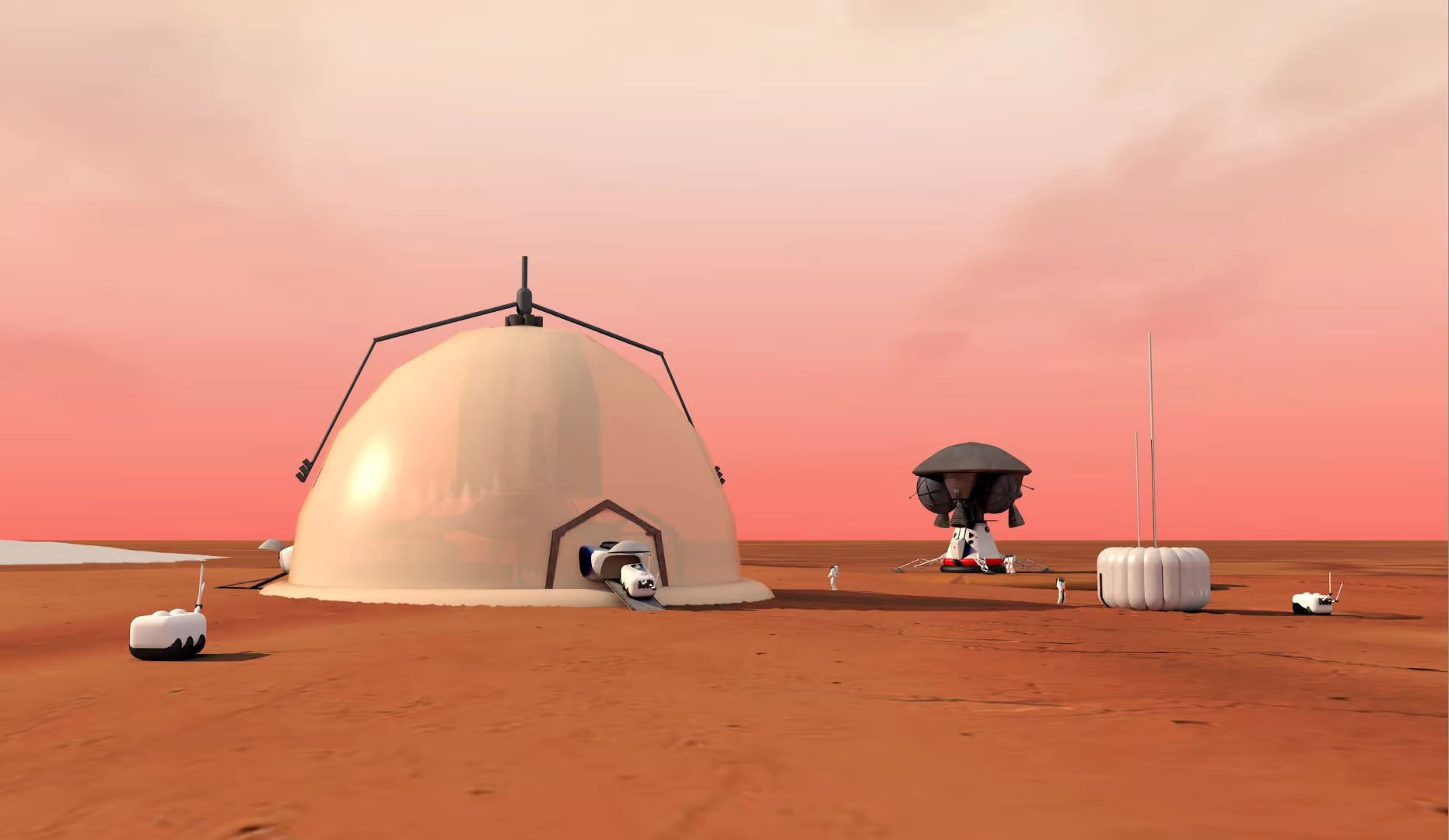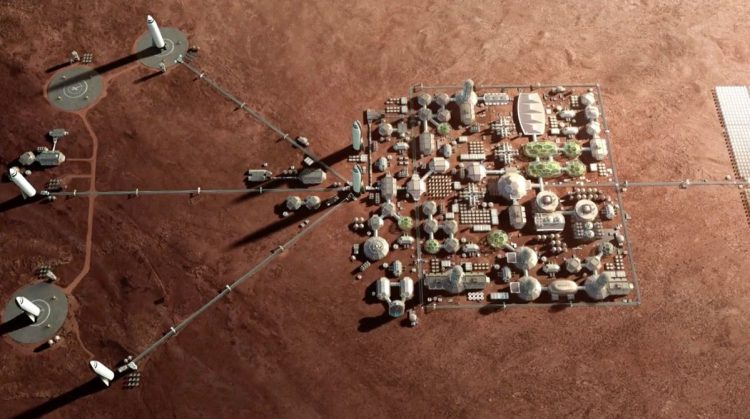Humanity has long dreamed of exploring and eventually settling on Mars, the fourth planet from the Sun. With recent advancements in technology and space exploration, this once far-fetched idea is steadily becoming a reality. The concept of Mars colonization is no longer confined to science fiction novels and movies; it is a goal being actively pursued by both governmental space agencies and private companies. In this article, we will examine the technological advancements, challenges, and ongoing efforts in humanity’s quest to colonize Mars and the steps being taken to make this dream a reality.
1. The Quest for Mars Colonization
The dream of reaching Mars has captivated the imagination of scientists, explorers, and visionaries for centuries. Over time, technological advances have enabled humanity to move closer to turning this dream into reality. Unlike the Moon, which is relatively close to Earth and has been the target of numerous space missions, Mars is much farther, at an average distance of about 225 million kilometers (140 million miles) from Earth. This presents unique challenges, not only for travel but also for sustainability on the Martian surface.
Several space agencies and companies, including NASA, SpaceX, and other international organizations, are currently working towards sending humans to Mars and eventually establishing a permanent colony. But while advancements in spacecraft, propulsion systems, and life support systems are progressing rapidly, there remain numerous obstacles that must be overcome before Mars colonization becomes feasible.
2. Technological Advancements for Mars Colonization
In order to colonize Mars, we need to develop cutting-edge technology that can address the harsh conditions of the planet. These technological advancements are critical for ensuring the survival of human settlers on Mars, and they include improvements in spacecraft, propulsion, life support systems, and habitat construction.
1. Spacecraft and Propulsion Systems
One of the key challenges in Mars colonization is developing spacecraft capable of transporting humans safely to and from the Red Planet. The trip to Mars could take anywhere from six to nine months, depending on the position of the planets in their respective orbits. This lengthy journey requires highly efficient propulsion systems and spacecraft designed to provide food, water, and shelter for the astronauts during their travel.
SpaceX, led by Elon Musk, has been at the forefront of developing technologies that could make Mars travel a reality. Their Starship project aims to create a fully reusable spacecraft capable of carrying humans to Mars. The Starship is designed to be large enough to hold dozens of passengers, along with the necessary supplies for long-duration space travel. SpaceX envisions sending a crew of astronauts on a mission to Mars by the mid-2020s, with the ultimate goal of building a sustainable human settlement on the planet.
NASA is also working on its Orion spacecraft, which is being developed for deep-space missions, including Mars exploration. While Orion is primarily focused on returning humans to the Moon with NASA’s Artemis program, the spacecraft is being designed with the flexibility to support future Mars missions.
2. Life Support Systems
A sustainable Mars colony must provide astronauts with everything they need to survive in an environment where conditions are far harsher than anything on Earth. Mars has a thin atmosphere composed mostly of carbon dioxide, extremely low temperatures, and high levels of radiation, which pose significant challenges to human life.
Life support systems will be vital for any Mars mission or colony. These systems must provide breathable air, potable water, and food for astronauts during their journey to Mars and while they reside on the planet. NASA has already tested systems for recycling air and water, which will be crucial for long-term habitation. Additionally, growing food on Mars is another significant challenge, as the planet’s soil lacks the necessary nutrients to support plant life.
NASA’s Bioregenerative Life Support Systems aim to create closed-loop environments where waste products like carbon dioxide are converted into oxygen, and human waste can be turned into fertilizers to grow food. Research is also underway to explore ways to use the Martian regolith (soil) to produce oxygen, water, and other resources.
SpaceX is also looking into ways to develop closed-loop systems for food, water, and oxygen production, while NASA is investigating growing crops on Mars using hydroponics and other soil-free methods.
3. Building Habitats on Mars
In addition to spacecraft and life support systems, the development of durable and effective habitats is essential for Mars colonization. The habitats must protect settlers from extreme temperatures, radiation, and Martian dust storms. Moreover, these habitats need to be sustainable and capable of being constructed with materials that are either brought from Earth or sourced from the Martian surface.
NASA and private companies are currently working on designs for Martian habitats. One such concept is the Mars Ice House, which uses ice as a building material to create insulated, radiation-resistant shelters. Another proposed solution is the inflatable habitats, such as Bigelow Aerospace’s BEAM module, which could be expanded and inflated once on Mars.
In addition, 3D printing technology could play a crucial role in building habitats on Mars. NASA has conducted successful tests of 3D printing technology on Earth using simulated Martian soil, which could potentially be used to print structures like shelters and walls once on Mars.

3. Challenges in Mars Colonization
Despite the many technological advancements, there are still several challenges to overcome in the pursuit of Mars colonization. These include the effects of radiation exposure, the psychological challenges of long-term space travel, and the sustainability of life on Mars.
1. Radiation Exposure
One of the most significant challenges to human health on Mars is the planet’s lack of a magnetic field and thick atmosphere, which on Earth serve as protection from harmful cosmic radiation and solar radiation. Prolonged exposure to this radiation could increase the risk of cancer, neurological disorders, and other health issues for astronauts.
To mitigate the effects of radiation, scientists are exploring several strategies, such as creating habitats with radiation shielding or using underground bunkers. The Martian soil itself could serve as a natural radiation shield, and future habitats may be built beneath the surface or inside lava tubes to protect settlers from radiation.
2. Psychological Challenges
Mars colonization will also place significant psychological demands on astronauts. A crew of settlers on Mars will be isolated from Earth, with no ability to communicate in real-time due to the communication delay between Earth and Mars, which can range from 13 to 24 minutes one way.
The isolation, confinement, and distance from Earth will make it essential to provide psychological support for the crew. Researchers are already studying the mental health aspects of long-duration space missions by simulating Mars-like conditions on Earth. For instance, NASA’s HI-SEAS (Hawaii Space Exploration Analog and Simulation) mission conducted a series of simulated Mars missions in isolation to study the effects of prolonged confinement on crew dynamics and mental health.
3. Sustainability of Resources
A successful Mars colony will need to be self-sustaining, meaning that settlers must be able to produce their own food, water, and oxygen without relying on resupply missions from Earth. This will require significant advancements in resource utilization, including the extraction of water from the Martian atmosphere or regolith and the use of in-situ resource utilization (ISRU) technologies to harness local materials for building structures, generating energy, and producing fuel.
NASA’s MOXIE experiment on the Perseverance rover has already demonstrated the feasibility of extracting oxygen from Mars’ carbon dioxide-rich atmosphere, which could play a critical role in the sustainability of a future colony.
4. The Road Ahead: Timelines and Goals
The timeline for Mars colonization remains uncertain, but several ambitious goals have been set for the coming decades. SpaceX aims to send its first crewed mission to Mars in the mid-2020s, with a longer-term goal of establishing a self-sustaining colony by the 2050s. NASA’s Artemis program will first return humans to the Moon by the 2020s, using the Moon as a proving ground for technologies and systems needed for future Mars missions.
While significant progress has been made in developing the necessary technology and infrastructure, it will likely be many years before humans are able to settle on Mars. The timeline will depend on continued advancements in space travel, life support systems, radiation shielding, and resource utilization technologies, as well as overcoming the psychological and logistical challenges associated with long-term space exploration.
5. Conclusion: A New Frontier for Humanity
Mars colonization is one of the most exciting and challenging endeavors in the history of space exploration. While there are still many hurdles to overcome, the advancements in technology and the collaborative efforts of government agencies and private companies have brought humanity closer than ever to becoming a multi-planetary species.
The dream of settling on Mars may not be realized in the immediate future, but the continued progress in space exploration provides hope that future generations will one day call the Red Planet home.











































Discussion about this post